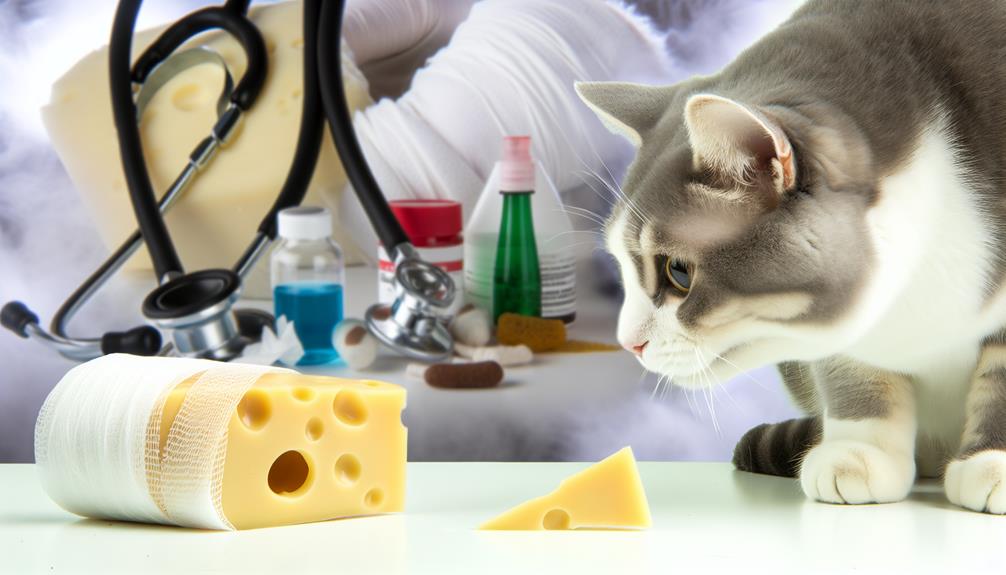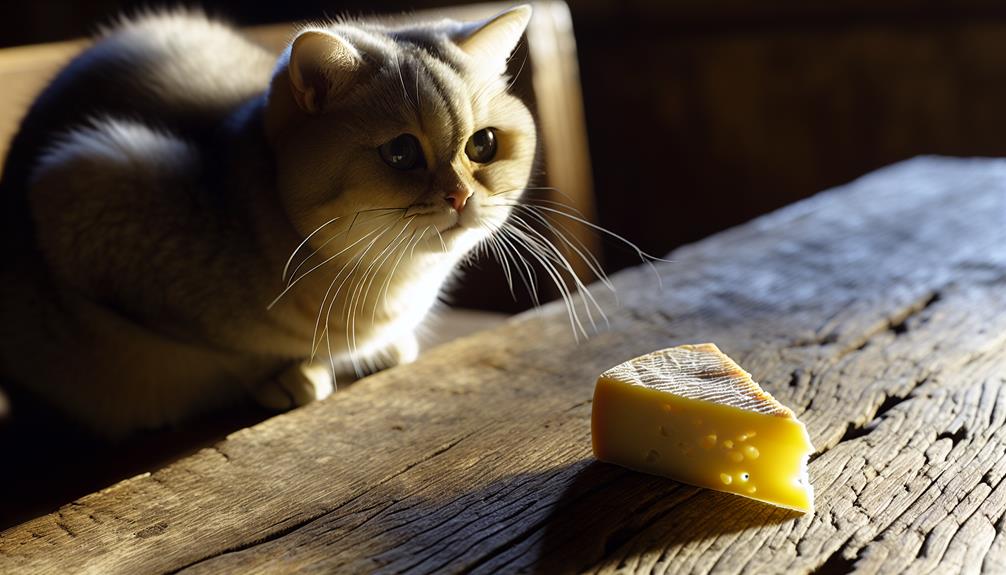You might wonder if sharing a bit of your cheese with your cat is a good idea. While cats can eat cheese in moderation, it's essential to understand the potential health risks involved. Many adult cats are lactose intolerant, which means that dairy products like cheese can lead to digestive issues. Cheese is also high in fat and sodium, which could contribute to obesity and dehydration. So, should you offer your feline friend a nibble of cheese now and then? Let's explore what experts recommend and whether this treat is truly worth the risk.
Nutritional Content of Cheese
When it comes to understanding the nutritional content of cheese, you'll find it packs a variety of essential nutrients. Cheese is rich in protein, which is important for muscle maintenance and repair. Different cheese varieties, such as cheddar, mozzarella, and Swiss, offer various nutritional benefits, but they all generally provide a good source of calcium, essential for bone health.
Cheese also contains essential fatty acids, which play a role in cellular function and overall energy provision. Vitamins A and B12 are prevalent in many cheese varieties, contributing to vision health, immune function, and red blood cell formation. Meanwhile, minerals like zinc and phosphorus aid in metabolic processes and skeletal strength.
However, cheese is also high in saturated fats and sodium. While moderate consumption can be beneficial, excessive intake may lead to health issues such as hypertension and cardiovascular disease. It's important to balance cheese consumption with other nutrient-dense foods to guarantee a well-rounded diet.
For those considering cheese in a pet's diet, understanding these nutritional benefits and potential downsides is significant. Cats, being obligate carnivores, primarily thrive on meat-based proteins. While they can derive some nutritional gains from cheese, it's not an essential part of their diet. You should be mindful of the types and quantities of cheese offered to your feline friends.
Lactose Intolerance in Cats
Lactose intolerance in cats is a noteworthy factor when thinking about incorporating cheese into their diet. Many cats lack the enzyme lactase, which is vital for lactose digestion. Lactase breaks down lactose, the sugar found in milk and dairy products, into glucose and galactose, which can then be absorbed by the digestive system. Without sufficient lactase, cats can't effectively digest lactose, leading to gastrointestinal issues.
In the context of a feline diet, it's important to recognize that most adult cats are naturally lactose intolerant. Kittens produce lactase, allowing them to digest their mother's milk. However, as they grow, the production of this enzyme markedly decreases. This reduction means that introducing dairy products, like cheese, can be problematic for adult cats. Symptoms of lactose intolerance in cats can include diarrhea, vomiting, bloating, and abdominal pain—none of which are pleasant for your furry friend.
While cheese might seem like a tasty treat, it's vital to weigh the potential discomfort it could cause. The key to a healthy feline diet is to confirm it meets their nutritional needs without causing adverse reactions. Instead of cheese, you might want to explore other treat options that are specifically formulated for cats. These alternatives are designed to be safe and nutritionally appropriate.
Health Risks of Cheese

Cheese can pose several health risks to cats, making it a less-than-ideal treat option. First and foremost, cheese allergies are a significant concern. While not overly common, some cats can develop allergic reactions to the proteins found in cheese. These reactions can manifest as skin irritations, gastrointestinal upset, or even respiratory issues. Consequently, it's essential to observe your cat closely if you ever decide to offer cheese and consult your veterinarian at the first sign of an allergic reaction.
Moreover, feline digestion isn't well-suited to handle dairy products. Cats are obligate carnivores, meaning their digestive systems are optimized for a diet primarily composed of meat. Cheese, being a dairy product, contains lactose and casein, which many cats find difficult to digest. This difficulty is primarily due to the lack of sufficient lactase, the enzyme required to break down lactose. As a result, consuming cheese can lead to symptoms such as diarrhea, vomiting, and abdominal pain.
Additionally, cheese is high in fat and salt, which can contribute to obesity and other metabolic issues in cats. Excessive fat intake can strain your cat's liver and pancreas, potentially leading to conditions like pancreatitis. High sodium levels can also have adverse effects, including dehydration and hypertension, which can further exacerbate existing health issues.
Cheese as an Occasional Treat
You might wonder if it's ever okay to give your cat a small piece of cheese as an occasional treat. While cheese isn't toxic to cats, it's important to evaluate the health implications and your feline's dietary needs. Many cats are lactose intolerant, meaning they lack the enzyme lactase needed to break down lactose, a sugar found in dairy products. This can lead to gastrointestinal upset, including diarrhea and stomach cramps.
If you're contemplating cheese as a treat, moderation is vital. A tiny piece of cheese once in a blue moon won't likely cause harm, but it shouldn't become a regular part of your cat's diet. Always monitor your cat for any adverse reactions after consuming cheese. If you notice any signs of discomfort or digestive issues, it's best to avoid giving cheese altogether.
Rather than cheese, you might explore other treat alternatives that align better with feline preferences and nutritional requirements. Lean meats like cooked chicken or turkey, small pieces of fish, or specially formulated cat treats can be healthier options. These alternatives are more in line with a cat's natural carnivorous diet and are less likely to cause digestive issues.
Additionally, it's worth noting that some cats may have specific preferences or allergies, which should be taken into account when selecting treats. Always consult with your veterinarian before introducing any new food into your cat's diet, including cheese. They can provide personalized guidance based on your cat's health history and nutritional needs.
Ultimately, while a small piece of cheese might seem like a harmless indulgence, prioritizing your cat's health with appropriate treat alternatives is always the best approach.
Expert Recommendations

For pet owners evaluating cheese as a treat for their feline friends, expert recommendations underscore the significance of understanding the nutritional and physiological impacts. Cats are obligate carnivores, meaning their diet should primarily consist of meat. While cheese might seem like a convenient treat, it's essential to be aware of its potential drawbacks.
Experts advise that not all cheese types are suitable for cats. Here are a few key points to reflect on:
- Lactose Intolerance: Most adult cats are lactose intolerant. Small amounts of cheese might not show immediate adverse effects, but regular consumption can lead to gastrointestinal issues, including diarrhea and vomiting.
- High Fat Content: Cheese is rich in fats, which can contribute to obesity and related health problems in cats if consumed frequently. Even if your cat shows a preference for cheese, moderation is important.
- Nutritional Imbalance: Cheese lacks the essential nutrients that cats need. Relying on cheese as a treat can displace more nutritionally balanced options, leading to deficiencies over time.
When it comes to cheese types, opt for those with lower lactose content, such as hard cheeses like cheddar or Swiss. However, even these should be given sparingly. Soft cheeses and those with added flavors or ingredients (like garlic or onion) are particularly harmful and should be avoided entirely.
Ultimately, while some cats might develop a preference for cheese, it's essential to prioritize their overall health and nutritional needs. Regular vet consultations can help you determine the best treats for your feline friend, ensuring they remain healthy and happy. By being informed and cautious, you can make better choices that contribute to your cat's well-being.
Conclusion
So, can your cat eat cheese? While it can be an occasional treat, remember the potential health risks: lactose intolerance, high fat, and sodium content. A small morsel now and then might not hurt, but is it worth the risk of gastrointestinal upset or obesity? Always consult with your veterinarian before introducing new foods. Treats should enhance your cat's health, not compromise it. Keep their well-being in mind and choose wisely.
